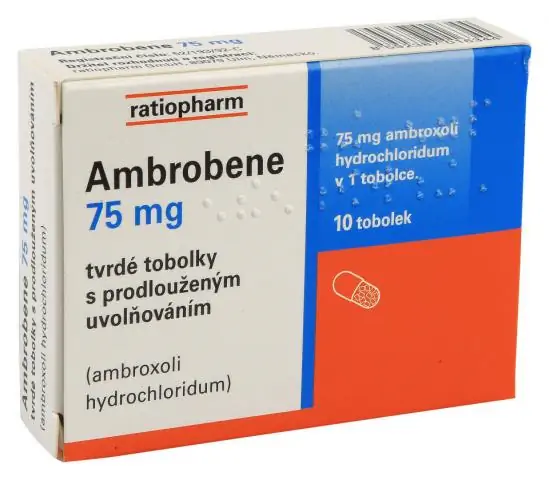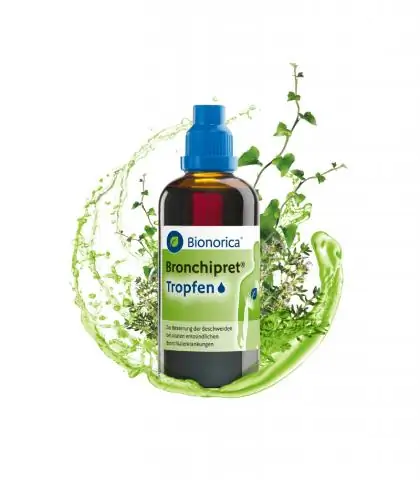- Author Rachel Wainwright wainwright@abchealthonline.com.
- Public 2023-12-15 07:39.
- Last modified 2025-11-02 20:14.
Citovir-3 syrup for children
Tsitovir-3 syrup for children: instructions for use and reviews
- 1. Release form and composition
- 2. Pharmacological properties
- 3. Indications for use
- 4. Contraindications
- 5. Instructions for the use of children: method and dosage
- 6. Side effects
- 7. Overdose
- 8. Special instructions
- 9. Application during pregnancy and lactation
- 10. Use in childhood
- 11. Drug interactions
- 12. Analogs
- 13. Terms and conditions of storage
- 14. Terms of dispensing from pharmacies
- 15. Children's reviews
- 16. Price of children in pharmacies
Latin name: Cytovir-3
ATX code: L03AX
Active ingredient: alpha-glutamyl-tryptophan + bendazole + ascorbic acid (alpha-glutamyl-triptophanum + bendazolum + acidum ascorbinicum)
Manufacturer: CJSC MB NPK (Medical and biological research and production complex) "Cytomed", Russia
Description and photo update: 2018-23-10

Citovir-3 syrup for children is a drug with immunostimulating efficacy for use in pediatrics. Immunomodulator of choice for frequently ill children during the period of acute respiratory viral infections.
Release form and composition
Dosage form of the drug Tsitovir-3 syrup for children - syrup: sweet, viscous, thick liquid from colorless to light yellow or yellow [50 ml each in dark glass vials, sealed with a plastic lid equipped with a first opening control or a first opening control and protection from children; in a cardboard box 1 bottle complete with a dosing device (measuring cup, dosing spoon or pipette)].
1 ml of syrup contains:
- active ingredients: alpha-glutamyl-tryptophan sodium (equivalent to the content of alpha-glutamyl-tryptophan) - 0.15 mg; bendazole hydrochloride - 1.25 mg; ascorbic acid - 12 mg;
- auxiliary ingredients: sucrose, purified water.
Pharmacological properties
Pharmacodynamics
Citovir-3 syrup for children is an immunomodulator of etiotropic and immunostimulating action, which has antiviral activity against viruses that cause acute respiratory infections (acute respiratory viral diseases) and influenza viruses of type A and B.
Reducing the severity of the main clinical symptoms of acute respiratory infections and influenza, as well as reducing the duration of the manifestation of symptoms of diseases, Cytovir-3 syrup for children has a complex therapeutic and prophylactic effect on the body, combining the effects of its active components:
- alpha-glutamyl-tryptophan (thymogen): a synergist of the immunomodulatory effect of bendazole, normalizes the T-cell link of immunity;
- bendazole: an inducer of endogenous interferon production with immunomodulatory efficacy, which normalizes the body's immune response; enzymes produced in the cells of various organs, due to their stimulation with interferon, inhibit the replication of viruses;
- ascorbic acid: activator of the humoral link of immunity, normalizes capillary permeability, thereby reducing inflammation; an antioxidant that neutralizes oxygen radicals associated with inflammatory processes; increases the body's resistance to infection.
Pharmacokinetics
When administered orally, the drug is completely absorbed from the gastrointestinal tract. The bioavailability of its active components is: bendazole - ~ 80%, alpha-glutamyl-tryptophan - ≤ 15%, ascorbic acid - up to 70%.
Pharmacokinetic characteristics of the components:
- alpha-glutamyl-tryptophan: under the influence of peptidases, it is split into L-tryptophan and L-glutamic acid, which are used by the body in the processes of protein synthesis;
- bendazole: biotransformed in the blood by methylation and carboethoxylation of the imino group of the imidazole ring of bendazole to form two conjugates: 1-carboethoxy-2-benzylbenzimidazole and 1-methyl-2-benzylbenzimidazole. The metabolites of bendazole are excreted in the urine;
- ascorbic acid (vitamin C): absorbed from the digestive tract mainly in the jejunum, about 25% of the substance binds to plasma proteins. After oral administration, the time to reach the maximum concentration (T max) - 4 hours. Vitamin C easily penetrates into the blood cells (leukocytes and platelets) and enters all tissues with the blood, penetrates the placental barrier. The binding of ascorbic acid in the intestine is reduced by pathologies of the gastrointestinal tract (intestinal motility disorders, gastric ulcer and 12 duodenal ulcer, giardiasis, helminthic invasion), intake of fresh juices (vegetable, fruit) and alkaline drinks. Vitamin C is metabolized mostly in the liver, forming deoxyascorbic, then oxaloacetic and diketogulonic acids. The substance is excreted unchanged, as well as in the form of metabolites: through the kidneys - with urine, through the intestines - with feces, as well as with breast milk and sweat.
Indications for use
Citovir-3 syrup for children is recommended for the prevention and complex treatment of acute respiratory infections and influenza in children over 1 year old.
Contraindications
- period of pregnancy;
- children's age up to 1 year;
- diabetes;
- hypersensitivity to the components of the drug.
Patients with arterial hypertension should consult a doctor before taking an antiviral drug.
Instructions for use of Tsitovir-3 syrup for children: method and dosage
Citovir-3 syrup for children is taken orally half an hour before meals.
The dosage regimens for prevention and treatment are identical, the syrup is taken 3 times a day in a dose depending on the child's age:
- 1-3 years - 2 ml per dose;
- 3-6 years old - 4 ml per dose;
- 6-10 years old - 8 ml per dose;
- more than 10 years - 12 ml per dose.
Duration of use - 4 days, if improvement does not occur after 3 days of treatment, symptoms worsen or new ones appear, you should consult a doctor.
If necessary, the prophylactic course may be repeated after 3-4 weeks.
Citovir-3 syrup for children is recommended to be taken strictly according to the indications, according to the described method of administration, in the doses indicated in the instructions. If necessary, consult a doctor before taking the drug.
Side effects
Possible negative reactions due to taking the drug:
- cardiovascular system: short-term decrease in blood pressure;
- hypersensitivity reactions: urticaria, upon the appearance of which, the use of the drug is discontinued and symptomatic treatment begins with the intake of antihistamines.
The appearance / aggravation of the above reactions or any other side effects indicates the need to consult a doctor.
Overdose
There is no data.
special instructions
When carrying out repeated courses of therapy or prophylaxis, it is recommended to control the concentration of glucose in the blood.
Influence on the ability to drive vehicles and complex mechanisms
According to the instructions, Tsitovir-3 syrup for children does not affect the concentration of attention and the speed of psychomotor reactions; approved for admission when performing potentially hazardous activities.
Application during pregnancy and lactation
There are not enough clinical observations on the safety and efficacy of the drug during pregnancy, and therefore Citovir-3 syrup for children is prohibited to use during this period.
During lactation, the use of an immunostimulant is allowed, provided that the intended benefits for the mother exceed the potential risks for the child, but only after consulting a doctor.
Pediatric use
In pediatric practice, the use of the drug for the treatment of children under the age of 1 year is prohibited.
Drug interactions
Alpha-glutamyl-tryptophan: no interaction with other drugs / drugs has been identified.
Bendazole: prevents the growth of OPSS (total peripheral vascular resistance) caused by non-selective β-blockers; potentiates the hypotensive effect of diuretics and antihypertensive drugs, helping to reduce blood pressure; phentolamine increases the hypotensive effect of bendazole.
Vitamin C:
- benzylpenicillin and tetracyclines: increases their concentration in the blood;
- iron supplements: improves their absorption in the intestine;
- heparin and indirect anticoagulants: reduces their effectiveness;
- ASA (acetylsalicylic acid, or aspirin), oral contraceptives, fresh fruit and vegetable juices, alkaline drinks: reduce the absorption of ascorbic acid and its assimilation; ascorbic acid reduces the level of oral contraceptives in the blood; ASA increases the excretion of ascorbic acid in the urine, ascorbic acid inhibits the excretion of ASA in the urine; aspirin reduces the absorption of ascorbic acid by about 30%; preparations containing ASA and short-acting sulfonamides increase the risk of crystalluria; ascorbic acid slows down the excretion of acids by the kidneys, increases the excretion of drugs with an alkaline reaction (including alkaloids);
- isoprenaline: ascorbic acid reduces its chronotropic effect;
- antipsychotics (neuroleptics) - phenothiazine derivatives: reduces their therapeutic effect by decreasing tubular reabsorption of amphetamine and tricyclic antidepressants;
- barbiturates and primidone: increase urinary excretion of ascorbic acid.
Citovir-3 syrup for children is allowed to be used simultaneously with other antiviral drugs and symptomatic therapy for acute respiratory infections and influenza.
If it is necessary to combine drug therapy with the above or other drugs, the patient should seek the advice of a doctor.
Analogs
Analogs of Tsitovir-3 syrup for children: Arbidol, Anaferon, Alokin alfa, Arbivir-health, Kagocel, Immunal, Lavomax, Timalin, Orvirem, Echinatsin Madaus, etc.
Terms and conditions of storage
Store at temperatures up to 25 ° C. Keep out of the reach of children.
Shelf life is 2 years.
Terms of dispensing from pharmacies
Available without a prescription.
Reviews about Tsitovir-3 syrup for children
According to reviews, Citovir-3 syrup for children is a good immunostimulant that helps not to get sick during an exacerbation of seasonal viral infections, and in case of illness - facilitates the course of the disease. Many parents note the high efficiency of the drug and its pleasant sweet taste, which greatly facilitates the treatment of children.
Price for Tsitovir-3 syrup for children in pharmacies
The approximate price for Tsitovir-3 syrup for children, 50 ml in a bottle, is about 400 rubles.

Maria Kulkes Medical journalist About the author
Education: First Moscow State Medical University named after I. M. Sechenov, specialty "General Medicine".
Information about the drug is generalized, provided for informational purposes only and does not replace the official instructions. Self-medication is hazardous to health!






